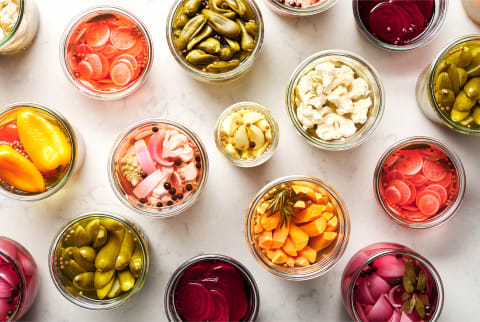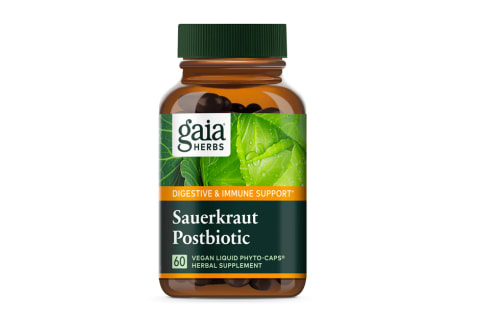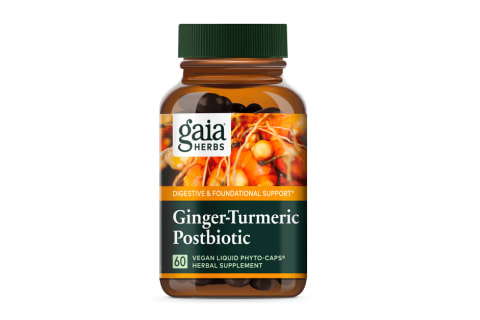Advertisement
A Sauerkraut Supplement? Why Postbiotics Belong In Your Gut Health Routine

Fermented foods have been around for millenniums but only recently stepped into the spotlight of our gut health routines. Sauerkraut, kimchi, kefir—as beneficial as these postbiotics are, we don't necessarily enjoy eating them or hunting them down. And if you're wondering how postbiotics fit into the bigger picture alongside prebiotics and probiotics…you're not the only one.
Prebiotics, probiotics, postbiotics: What's the difference?
It takes time to get them all straight. Of the three, you're likely most familiar with probiotics. Since the early 2000s, increasing studies have inspired the widespread development and popularity of different probiotic products, from yogurt to supplements. Probiotics1 are often referred to as "friendly bacteria." They increase the amount of microorganisms in our gut to help maintain a diverse microbiome.
Whereas probiotics are live bacteria, prebiotics2 are nondigestible food compounds—specifically, fibers. As they ferment, prebiotics serve as food for the bacteria in our gut (you guessed it, the probiotics!). Examples of a few prebiotic foods include beans, dandelion greens, oats, kiwifruit, and onions. But where do postbiotics fit in?
Aside from being the newest term in the realm of "-biotics," postbiotics are the bioactive compounds left over once the probiotics and prebiotics are digested and fermented. We can get more of them by eating cultured and fermented foods and with supplements like Gaia Herbs Ginger-Turmeric Postbiotic or Sauerkraut Postbiotic. If you're looking for motivation, you'll find it in the research.
The benefits of postbiotics
Postbiotics may be the "waste" product of prebiotics and probiotics, but they have their own unique benefits. As far as digestive health goes—postbiotics3 help maintain the integrity of our intestinal tract lining.* Studies also suggest that postbiotics may help produce short-chain fatty acids (SCFAs), which further benefit our gut.* Butyrate, for example, is a SCFA that boosts fluid absorption and helps with intestinal barrier function.*
Beyond digestive health, postbiotics play a role in the regulation of our immune system, from inhibiting the growth of pathogens to supporting inflammatory balance.* Other studies connect the end products of postbiotics (like SCFAs) to metabolic health—from appetite regulation4 to normal lipid metabolism3 to insulin sensitivity3.* Since metabolic health is connected to our cardiovascular system, certain postbiotics may even support normal blood pressure and cholesterol levels5.*

The easiest way to get more postbiotics
A diverse gut microbiome is an essential aspect of digestive health. Postbiotics have an important role to play, but fermented foods like kimchi and tempeh are an acquired taste. Finding a farmers market or store that carries a tasty product also isn't a guarantee. That's why we're so excited (and frankly, relieved) about adding the new Ginger-Turmeric Postbiotic and Sauerkraut Postbiotic from Gaia Herbs to our gut health routine.
Made from fermented ginger and turmeric sauerkraut juice extract, the Ginger-Turmeric Postbiotic supports a healthy gut microbiome and promotes a healthy inflammatory response.* Not to mention, ginger is known to stimulate digestive enzymes6.* The Sauerkraut Postbiotic (made from fermented sauerkraut juice extract) supports healthy function in the lower GI tract, promoting regularity and nutrient absorption.* If we're honest, it's tough to get sauerkraut and turmeric in our daily lives. But a high-quality supplement? That we can do.
Emphasis on quality
We can't emphasize the importance of quality enough—especially because it's a different conversation when it comes to postbiotics. If taking probiotics has long been your jam, you're probably used to assessing products based upon CFUs (colony-forming units). CFU count indicates how many live active cultures are present in a probiotic product.
In contrast, postbiotics (and prebiotics) are measured by weight in milligrams or grams instead of CFUs. A high-quality postbiotic supplement is less about numbers and more about where its ingredients come from. Thankfully, Gaia Herbs supplements are potent but also purity-tested and screened for pesticides, microbes, and heavy metals. You can trust your gut but also their transparent sourcing.
The bottom line
Juggling all of the "-biotics" is no easy feat. But the more you understand about prebiotics, probiotics, and postbiotics, the more it makes sense that experts say well-being starts in the gut. Gut health is connected to everything: skin, immunity, mood, and beyond. We're here for solutions that make gut health more accessible and achievable. Especially if it means one less bowl of sauerkraut.
6 Sources
- https://www.sciencedirect.com/science/article/pii/S2772502222001457
- https://www.ncbi.nlm.nih.gov/pmc/articles/PMC6463098/#:~:text=Prebiotics%20and%20the%20Immune%20System,122%2C123%2C124%5D.
- https://www.ncbi.nlm.nih.gov/pmc/articles/PMC9177191/
- https://www.nature.com/articles/ncomms4611
- https://www.ncbi.nlm.nih.gov/pmc/articles/PMC7468815/
- https://www.ncbi.nlm.nih.gov/pmc/articles/PMC8001588/

This Type Of Fat Is Vital For Women's Health — Are You Getting Enough?
Molly Knudsen, M.S., RDN

New Study Confirms The 3 Habits That Age Your Brain Faster
Molly Knudsen, M.S., RDN

This Type Of Fat Is Vital For Women's Health — Are You Getting Enough?
Molly Knudsen, M.S., RDN

New Study Confirms The 3 Habits That Age Your Brain Faster
Molly Knudsen, M.S., RDN
















